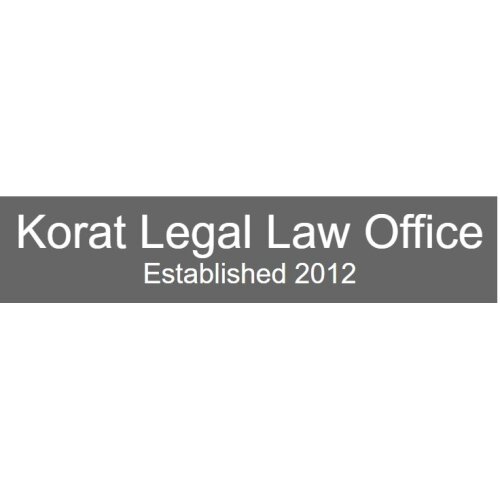Best Employer Lawyers in Nakhon Ratchasima
Share your needs with us, get contacted by law firms.
Free. Takes 2 min.
List of the best lawyers in Nakhon Ratchasima, Thailand
Thailand Employer Legal Articles
Browse our 1 legal article about Employer in Thailand written by expert lawyers.
- Thailand Employment Law: Essentials for Hiring and Retaining Talent
- In a world that is constantly changing, Thailand has become a very attractive place for companies who want to grow or start up in the lively South East Asia area. However, entering this beautiful landscape requires great knowledge of Thai employment laws which are a maze that can confuse even... Read more →
About Employer Law in Nakhon Ratchasima, Thailand
Nakhon Ratchasima, often referred to as Korat, is one of the largest provinces in Thailand. As a province with a significant population and thriving industries, employment laws here are particularly designed to balance the interests of employers and employees. Employer law in Nakhon Ratchasima falls under the national Thai Labor Protection Act, which sets out the rights and duties of employers and employees across the country. Local regulations may further define specific practices regarding employment contracts, working conditions, salary payments, and dispute resolutions.
Why You May Need a Lawyer
Engaging a lawyer can provide substantial benefits if you are an employer facing complex legal issues in Nakhon Ratchasima. Common situations where legal assistance might be necessary include drafting and reviewing employment contracts to ensure compliance with Thai labor law, managing disputes related to wrongful termination, solving workplace discrimination or harassment issues, and representing your company before labor courts. Legal counsel can also guide you in implementing fair labor practices that align with both local and national law.
Local Laws Overview
Understanding the local laws in Nakhon Ratchasima is crucial for employers. The Thai Labor Protection Act governs employment relationships, covering areas such as working hours, minimum wages, employee benefits, and occupational health and safety. It is essential to note that the Employment Promotion Act encourages fair employment practices and stipulates conditions for hiring foreign employees. Local regulations may extend these national laws, making it vital for employers to stay informed about any changes affecting their business operations in Nakhon Ratchasima.
Frequently Asked Questions
What is the minimum wage for employees in Nakhon Ratchasima?
The minimum wage in Nakhon Ratchasima is set by the government and may be revised periodically. Employers need to stay informed to ensure compliance with the latest regulations.
How many hours are employees legally allowed to work in a week?
Under Thai labor laws, employees are generally permitted to work up to 48 hours per week, with daily working hours not exceeding 8 hours. Overtime compensation is necessary for any work beyond this.
What should an employment contract include?
An employment contract in Thailand should clearly state the terms of employment, including job responsibilities, salary, working hours, leave entitlements, and conditions for termination.
Are there specific rules for terminating an employee in Nakhon Ratchasima?
Yes, there are legal procedures that must be followed to terminate an employee legally. Grounds for termination, notice periods, and severance pay must comply with the Labor Protection Act.
What are the legal requirements for hiring foreign employees?
Employers hiring foreign nationals must ensure they have the appropriate work permits and follow the conditions set by the Thai government, including minimum salary thresholds and specific roles that foreigners can perform.
How can employers handle workplace discrimination complaints?
Employers should address discrimination complaints promptly through thorough investigations and establish a workplace policy prohibiting discrimination, as part of compliance with relevant Thai laws.
What are the employer’s responsibilities regarding workplace safety?
Employers are required to adhere to occupational health and safety laws, ensuring a safe working environment and conducting regular safety training and inspections.
Are there specific local labor regulations in Nakhon Ratchasima to be aware of?
While national laws apply uniformly, any specific regional practices or agreements should be checked with local authorities to ensure full legal compliance.
How should salary increments and bonuses be regulated?
Salary increments and bonuses should be governed by clear company policies set out in employment contracts or agreements, observing any collective bargaining agreements if applicable.
What steps should an employer take when facing a labor dispute?
An employer should attempt mediation and negotiation to resolve disputes amicably, involving legal counsel to navigate proceedings as required under Thai labor laws.
Additional Resources
Employers seeking further guidance can consult the Ministry of Labor in Thailand for the most current regulations and guidelines. The Department of Employment, the Federation of Thai Industries, and the local Chamber of Commerce in Nakhon Ratchasima are valuable resources for employers needing assistance or compliance information.
Next Steps
If you require legal assistance regarding employment issues in Nakhon Ratchasima, consider scheduling a consultation with a local labor law attorney experienced in Thai employment laws. Document your concerns clearly, gather relevant documentation, and actively seek professional advice to ensure that your employment practices adhere to the legal requirements. Being proactive and informed can significantly benefit your company’s operations and employer-employee relationships.
Lawzana helps you find the best lawyers and law firms in Nakhon Ratchasima through a curated and pre-screened list of qualified legal professionals. Our platform offers rankings and detailed profiles of attorneys and law firms, allowing you to compare based on practice areas, including Employer, experience, and client feedback.
Each profile includes a description of the firm's areas of practice, client reviews, team members and partners, year of establishment, spoken languages, office locations, contact information, social media presence, and any published articles or resources. Most firms on our platform speak English and are experienced in both local and international legal matters.
Get a quote from top-rated law firms in Nakhon Ratchasima, Thailand — quickly, securely, and without unnecessary hassle.
Disclaimer:
The information provided on this page is for general informational purposes only and does not constitute legal advice. While we strive to ensure the accuracy and relevance of the content, legal information may change over time, and interpretations of the law can vary. You should always consult with a qualified legal professional for advice specific to your situation.
We disclaim all liability for actions taken or not taken based on the content of this page. If you believe any information is incorrect or outdated, please contact us, and we will review and update it where appropriate.









